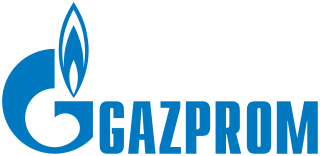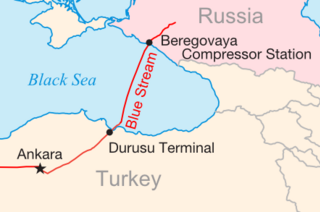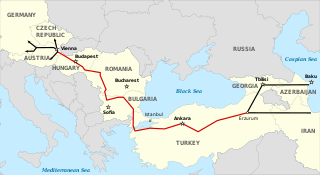Transport in Serbia includes transport by road, rail, air and water. Road transport incorporates a comprehensive network of major and minor roads. Rail transport is fairly developed, although dual track and electrification are not very common. Water transport revolves around river transport while air transport around country's tree main international airports.

PJSC Gazprom is a Russian majority state-owned multinational energy corporation headquartered in the Lakhta Center in Saint Petersburg. As of 2019, with sales over $120 billion, it was ranked as the largest publicly listed natural gas company in the world and the largest company in Russia by revenue. In the 2020 Forbes Global 2000, Gazprom was ranked as the 32nd -largest public company in the world. The Gazprom name is a contraction of the Russian words gazovaya promyshlennost. In January 2022, Gazprom displaced Sberbank from the first place in the list of the largest companies in Russia by market capitalization.

The economy of Serbia is a service-based upper middle income economy in Central Europe, with the tertiary sector accounting for two-thirds of total gross domestic product (GDP). The economy functions on the principles of the free market. Nominal GDP in 2022 is projected to reach $62.721 billion, which is $9,164 per capita, while GDP based on purchasing power parity (PPP) stood at $164.835 billion, which is $24,084 per capita. The strongest sectors of Serbia's economy are energy, the automotive industry, machinery, mining, and agriculture. The country's primary industrial exports are automobiles, base metals, furniture, food processing, machinery, chemicals, sugar, tires, clothes, and pharmaceuticals. Trade plays a major role in Serbian economic output. The main trading partners are Germany, Italy, Russia, China, and neighbouring Balkan countries.

Blue Stream is a major trans-Black Sea gas pipeline that carries natural gas to Turkey from Russia. The pipeline has been constructed by the Blue Stream Pipeline B.V., the Netherlands based joint venture of Russian Gazprom and Italian Eni. The Blue Stream Pipeline B.V. is an owner of the subsea section of pipeline, including Beregovaya compressor station, while Gazprom owns and operates the Russian land section of the pipeline and the Turkish land section is owned and operated by the Turkish energy company BOTAŞ. According to Gazprom the pipeline was built with the intent of diversifying Russian gas delivery routes to Turkey and avoiding third countries.

Nord Stream is a pair of offshore natural gas pipelines in Europe that runs under the Baltic Sea from Russia to Germany. It comprises the Nord Stream 1 (NS1) pipeline running from Vyborg in northwestern Russia, near Finland, and the Nord Stream 2 (NS2) pipeline running from Ust-Luga in northwestern Russia near Estonia. Both pipelines run to Lubmin in the northeastern German state of Mecklenburg-Vorpommern. Each pipeline comprises two pipes, denoted A and B, each of the four pipes being approximately 1,200 kilometres (750 mi) long and with approximate diameters of 1,220 millimetres (48 in). The combined capacity of the four pipes is 110 billion cubic metres per annum of natural gas.

The Nabucco pipeline was a failed natural gas pipeline project from Erzurum, Turkey to Baumgarten an der March, Austria to diversify natural gas suppliers and delivery routes for Europe. The pipeline was to lessen European dependence on Russian energy. The project was backed by several European Union states and the United States and was seen as rival to the Gazprom-Eni South Stream pipeline project. The main supplier was to be Iraq with potential supplies from Azerbaijan, Turkmenistan, and Egypt.
White Stream is a proposed pipeline project to transport natural gas from the Caspian region to Romania and Ukraine with further supplies to Central Europe.
The Trans-Balkan pipeline is a natural gas pipeline between Turkey and Ukraine with branches to Greece and North Macedonia. It was used by Gazprom for gas deliveries through Balkan countries to Turkey. Before construction of the Blue Stream pipeline it was the only international natural gas pipeline supplying Turkey.

South Stream was a canceled pipeline project to transport natural gas of the Russian Federation through the Black Sea to Bulgaria and through Serbia, Hungary and Slovenia further to Austria. It was never finished.
RWE Supply & Trading CZ is the largest natural gas trading company in the Czech Republic. It is owned by the German energy company RWE.

Russia supplies a significant volume of fossil fuels to other European countries. In 2021, it was the largest exporter of oil and natural gas to the European Union, and 40% of gas consumed in the EU came from Russia.
TurkStream is a natural gas pipeline running from Russia to Turkey. It starts from Russkaya compressor station near Anapa in Russia's Krasnodar Region, crossing the Black Sea to the receiving terminal at Kıyıköy.

Nord Stream 2 is a 1,234-kilometre-long (767 mi) natural gas pipeline from Russia to Germany running through the Baltic Sea, financed by Gazprom and several European energy companies. The construction of the pipeline started in 2011, to expand the Nord Stream 1 line and double annual capacity to 110 billion cubic metres. It was completed in September 2021, but has not yet entered service. Planning and construction of the pipeline were mired in political controversy over fears that Russia would use it for geopolitical advantage with Europe and Ukraine.
The Balkan Stream is a pipeline which transports natural gas from the Russian Federation to Serbia, via the Black Sea and Bulgaria, which replaced the earlier planned but abandoned South Stream. It is an extension of Turk Stream. The project is headed and financed by Srbijagas, the state-owned natural gas provider of Serbia. Currently, the construction of a gas pipeline interconnecting Niš and Dimitrovgrad to the Bulgarian border is underway, and next interconnecting Niš with Velika Plana and later Velika Plana and Batajnica, and there are also plans of interconnecting with Romania, Croatia and Bosnia and Herzegovina.
The 2022 global energy crisis began in the aftermath of the COVID-19 pandemic in 2021, with much of the globe facing shortages and increased prices in oil, gas and electricity markets. The crisis was caused by a variety of economic factors, labor shortages, disputes, climate change, and was later compounded by the Russian invasion of Ukraine.

The Russia–EU gas dispute flared up in March 2022 following the invasion of Ukraine in late February. Russia and the major EU countries clashed over the issue of payment for pipeline natural gas exported to Europe by Russia's Gazprom. In June, Russia cut the flow of gas by more than half, in July it stopped and resumed it, and in September it stopped it altogether. On 26 September 2022, the Nord Stream 1 and 2 gas pipelines both ruptured with evidence of sabotage.

The 2022 Nord Stream gas leaks were a series of explosions and subsequent underwater gas leaks that occurred on the Nord Stream 1 and Nord Stream 2 natural gas pipelines on 26 September 2022. Both pipeline pairs were built to transport natural gas from Russia to Germany through the Baltic Sea, and are majority owned by the Russian majority state-owned gas company, Gazprom. The leaks happened as the Baltic Pipe was being opened for natural gas to come in from the North Sea through Denmark to Poland and are believed to have been caused by intentional sabotage; however, the perpetrators' identities and the motives behind such intentional sabotage remain debated.
Nord Stream is a network of offshore natural gas pipelines in Europe which run under the Baltic Sea from Russia to Germany. It comprises two separate projects, Nord Stream 1 and 2. Both pipelines each comprise two pipes, NS1 A and B as well as NS2 A and B, for a total of 4 physical pipes. Both pipelines land in Lubmin, Germany.
The 2022 global energy crisis has caused varying effects in different parts of the world.










